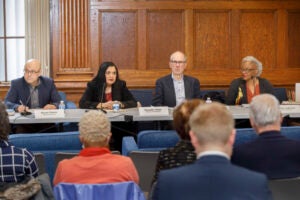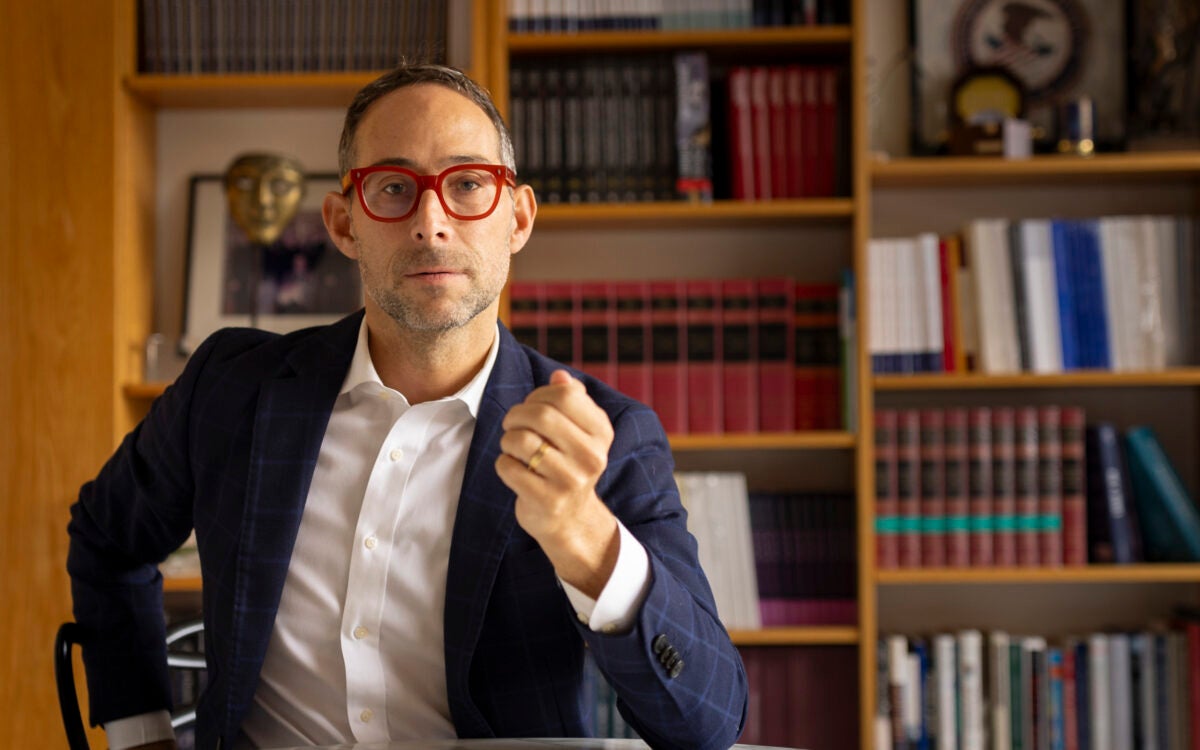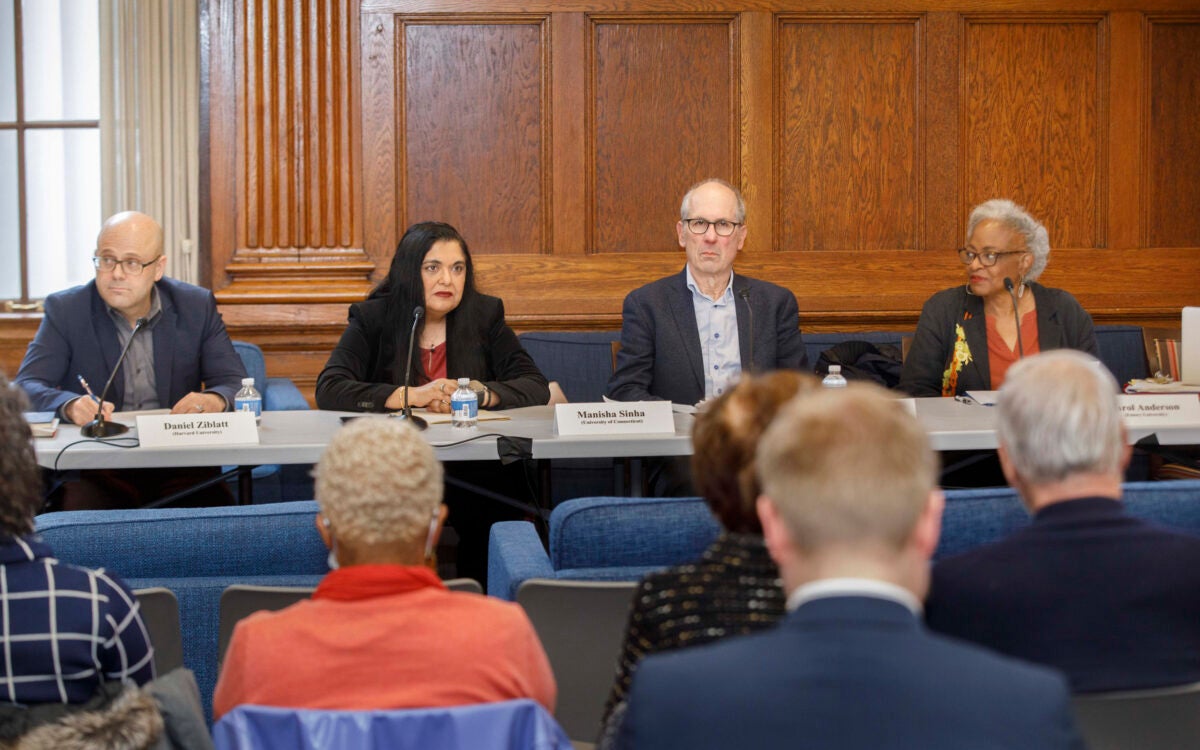Surgeon describes horrors that ensue when rape is a ‘weapon of war’
Denis Mukwege, a recent visitor to Harvard, is slow-spoken, weary, and grave.
And well he might be. For nearly a decade, Mukwege has been doctor to thousands of women raped in the course of a long civil war in south central Africa — in effect, that continent’s World War II — which has so far claimed 4 million lives.
He is chief surgeon and director of the Panzi Hospital in Bukavu. That’s a city in the eastern half of the Democratic Republic of the Congo (DRC), and the eye of the storm in what Mukwege and others call an epidemic of rape as a “weapon of war.”
Last week (April 8), Mukwege walked to the podium at Emerson 105 and in his measured French outlined for a rapt audience of 100 what to Western ears is unthinkable: a war that since 1996 has had within it a war against women. Victims — tens of thousands a year — are as old as 80 and as young as 3.
Women are raped in front of their villages and families by marauding militias spilling across the border from Rwanda and Burundi. Some of the women are killed outright by their attackers; others are taken into the bush for service as sexual slaves. The atrocities are beyond imagining: Rape with broken bottles, bayonets, and lengths of wood. Gunshots into the vagina.
Rape has always been present in war, said Mukwege, in Cambridge as a guest of the Harvard Humanitarian Initiative (HHI). But it’s different in the DRC because of the scale of the rape, the systematic nature of it, and the extreme brutality of it.
In some villages, he said, 90 percent of the women have been raped. “We are no longer talking about 100 women, or 1,000 women,” he said of his decade of observation. “We are talking about 100,000 women.”
Rape as a weapon of war is a fact of life in the Bukavu region that “defies understanding,” said physician and HHI co-director Michael VanRooyen, who helped introduced Mukwege.
But university researchers can help, by studying the problem in the field, he said, and by passing recommendations on to governments and to nongovernmental organizations.
The problem is complex, said VanRooyen, director of the Division of International Health and Humanitarian Programs in the Department of Emergency Medicine at Harvard-affiliated Brigham and Women’s Hospital. The implications of mass rape are medical, economic, political, and psychosocial. Next month, VanRooyen, who also holds professorships at Harvard’s Medical School (HMS) and School of Public Health (HSPH), makes the first in a series of visits to the DRC to interview perpetrators — one more facet of HHI research under way since last May, when HHI started a partnership with Mukwege’s Panzi Hospital.
Mass rape is now a prevalent feature of intrastate conflicts, said HHI co-director Jennifer Leaning, professor of the practice of international health at the HSPH and associate professor of medicine at HMS. (She’s also senior adviser in international and policy studies at the Radcliffe Institute for Advanced Study.)
International efforts to stop mass rape are failing, and also failed in the 1990s when similar — though smaller-scale — patterns of rape took place in Sierra Leone, Somalia, the Balkans, and elsewhere.
Today, she said, the DRC “is the epicenter of this epidemic,” where mass rape “thrives in a climate of impunity.”
The world needs robust prevention and intervention strategies, said Leaning, a frequent visitor to Africa, and these might spring, in part, from solid research.
HHI’s Panzi research team set out last year to “understand and characterize the phenomenon of sexual terrorism,” she said — an enterprise of scholarship in an unsettled place that is “somewhat novel, and a little edgy.” Despite peace agreements and a recent general election, parts of the eastern DRC are still largely unpoliced and violent.
At Emerson Hall, emergency medicine physician Susan A. Bartels described one HHI project at the 334-bed Panzi Hospital: a retrospective “chart review” of 652 cases. That’s about half the number of women who showed up with rape-related injuries in 2006. Many of the victims require surgery for fractures, anal trauma, and incontinence. They also have twice the regional rate of HIV infections.
More than half the women raped are married or widowed, said Bartels, and most (63 percent) are illiterate. Three-quarters of the attacks were gang rapes, she said, and most occurred at night, in a woman’s own home, in front of her family.
Such rapes, said Mukwege earlier, violate not just the women, but the husbands, brothers, and sons who feel impotent to intervene. “This is a show of force, of power,” he said on a “60 Minutes” episode aired for the Emerson Hall audience. “It’s done to destroy people.”
After such attacks, medical, social, and mental “consequences are severe, and common,” said Bartels. All women and girls in the eastern DRC need protection, she said, along with extended health care services — and they need some way to eliminate the social stigma that lingers after a rape.
Jocelyn Kelly, an M.P.H. candidate at the Harvard School of Public Health, is studying the social fallout from sexual violence. She interviewed rape survivors, NGO workers, and men from the Bukavu region who had witnessed attacks.
Among her findings: Nearly half the rape victims — put off by fear, poverty, the challenges of travel, and social stigma — waited over a year before seeking treatment. A third of them were rejected by their families after an attack. And the practice of rape “has jumped to civilians,” said Kelly. “People now look at [mass rape] as normal.”
Some women are so despondent — especially those attacked in the presence of their children — that they “have failed to survive,” said Mukwege, who does five surgeries a day, and copes, too, with the psychological consequences of rape. “That is most difficult to see.”
Meanwhile, government attention in the DRC is scant, and legal recourse is sketchy — certainly beyond the purview of raped women who are both terrified and poor.
Peace is shaky too, in a region where militias are still active, and where riches — gold, copper, diamonds, and tin — still motivate armed gangs, said Mukwege.
“We say the war has ended,” he said, with evident weariness. “But really it has not ended.”




